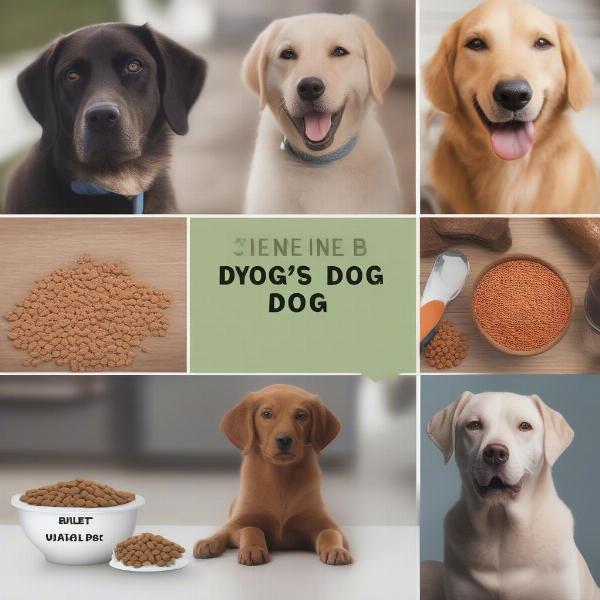Essential dog food provides the necessary nutrients your dog needs to thrive. From puppies to seniors, understanding your dog’s dietary needs is crucial for their overall health and well-being. Choosing the right essential dog food can be overwhelming with so many options available. This guide will break down everything you need to know about essential dog food, helping you make informed decisions for your furry friend.
Deciphering Dog Food Labels: What to Look For
Understanding dog food labels is the first step towards choosing the best essential dog food. Look for the AAFCO (Association of American Feed Control Officials) statement, which indicates whether the food meets nutritional standards. Pay close attention to the ingredient list. Meat, poultry, or fish should be listed first, followed by whole grains, fruits, and vegetables. Avoid foods with artificial colors, flavors, and preservatives.
Life Stages and Essential Dog Food: Tailoring Nutrition to Age
Essential dog food needs vary depending on your dog’s life stage. Puppies require food with higher protein and fat content to support their rapid growth. Adult dogs need a balanced diet to maintain their weight and energy levels. Senior dogs benefit from food that is lower in calories but higher in fiber to support their digestive health and manage age-related issues.
 Essential Dog Food for Different Life Stages
Essential Dog Food for Different Life Stages
Essential Nutrients for a Healthy Diet: Building Blocks for Canine Wellness
Essential dog food must contain a balance of proteins, fats, carbohydrates, vitamins, and minerals. Proteins provide amino acids for muscle development and repair. Fats provide energy and support healthy skin and coat. Carbohydrates offer a source of energy and fiber for digestion. Vitamins and minerals are crucial for overall health and bodily functions.
What are the Essential Nutrients in Dog Food?
Essential nutrients in dog food include proteins, fats, carbohydrates, vitamins, and minerals. These nutrients are the building blocks for a healthy canine diet, supporting everything from muscle growth and repair to energy levels and immune function. A balanced combination of these nutrients is key to a thriving, happy dog.
Common Dietary Concerns: Addressing Allergies and Sensitivities
vital essential dog food can sometimes trigger allergies or sensitivities in dogs. Common allergens include beef, chicken, dairy, wheat, and corn. If your dog experiences itching, digestive upset, or other symptoms after eating, consult your veterinarian. They can help you identify the allergen and recommend a hypoallergenic or limited ingredient diet.
How to Choose the Right Essential Dog Food for My Dog?
Choosing the right essential dog food involves considering your dog’s age, breed, activity level, and any health concerns. Reading labels carefully, understanding ingredient lists, and consulting with your veterinarian are essential steps in making the best choice for your furry companion.
Is Homemade Dog Food a Good Option for Providing Essential Nutrients?
While homemade dog food can be a viable option, it’s crucial to consult with a veterinary nutritionist to ensure the diet is balanced and provides all the essential nutrients your dog requires. Creating a nutritionally complete homemade diet can be complex and time-consuming.
Conclusion: Prioritizing Your Dog’s Nutritional Needs with Essential Dog Food
Choosing essential dog food is a crucial aspect of responsible dog ownership. By understanding your dog’s individual needs and selecting high-quality food, you can contribute to their overall health, longevity, and happiness. Remember to consult with your veterinarian for personalized advice and guidance.
dog food bag clip can be a useful tool for keeping your dog’s food fresh. Providing the right essential dog food is an investment in your dog’s well-being.
FAQ:
- What is the difference between “complete and balanced” and “for supplemental feeding”? “Complete and balanced” means the food provides all the necessary nutrients for a dog’s daily diet. “For supplemental feeding” means the food is intended to be given in addition to another food.
- How much essential dog food should I feed my dog? Feeding guidelines are typically provided on the food packaging. However, your dog’s individual needs may vary based on their age, breed, activity level, and other factors. Consult your veterinarian for specific recommendations.
- Can I switch my dog’s essential dog food suddenly? It’s best to gradually transition to a new food to avoid digestive upset. Mix increasing amounts of the new food with the old food over a period of several days.
- What are some signs of food allergies in dogs? Common signs include itching, skin redness, digestive issues (vomiting, diarrhea), and ear infections.
- What is the best way to store essential dog food? Store dry dog food in a cool, dry place in an airtight container to maintain freshness.
- Is grain-free essential dog food better for my dog? Not necessarily. Some dogs thrive on grain-free diets, while others may benefit from whole grains. Consult your veterinarian to determine the best option for your dog.
- How can I tell if my dog is getting the right essential nutrients from their food? Monitor your dog’s weight, coat condition, energy levels, and stool quality. If you have any concerns, consult your veterinarian.
greenies smart essentials dog food is another option to explore for providing your dog with essential nutrients.
ILM Dog is a leading international online resource dedicated to providing expert advice and information on all aspects of dog care and wellbeing. From breed selection and puppy care to senior dog health and nutrition, ILM Dog offers a wealth of practical guidance to help dog owners worldwide provide the best possible care for their canine companions. We specialize in dog breeds, health & medical care, training & behavior, nutrition & feeding, grooming & hygiene, products & accessories. Contact us at [email protected] or +44 20-3965-8624 for personalized support and expert advice.
dog travel food and water bowls are essential for keeping your dog hydrated and fed on the go.
dog food and toys are important for a dog’s overall well-being.